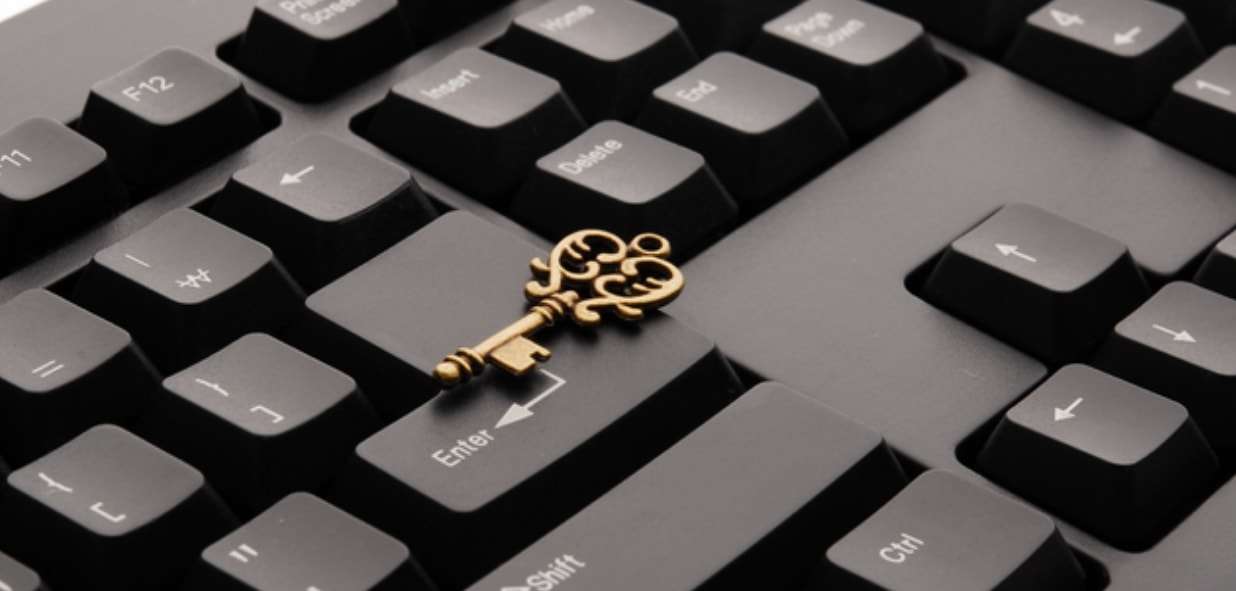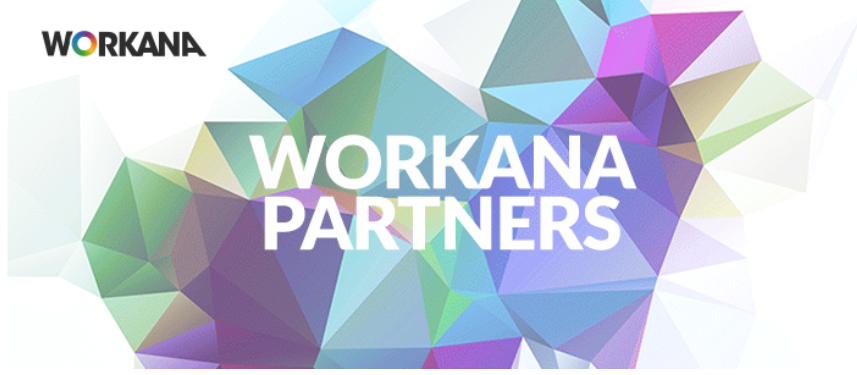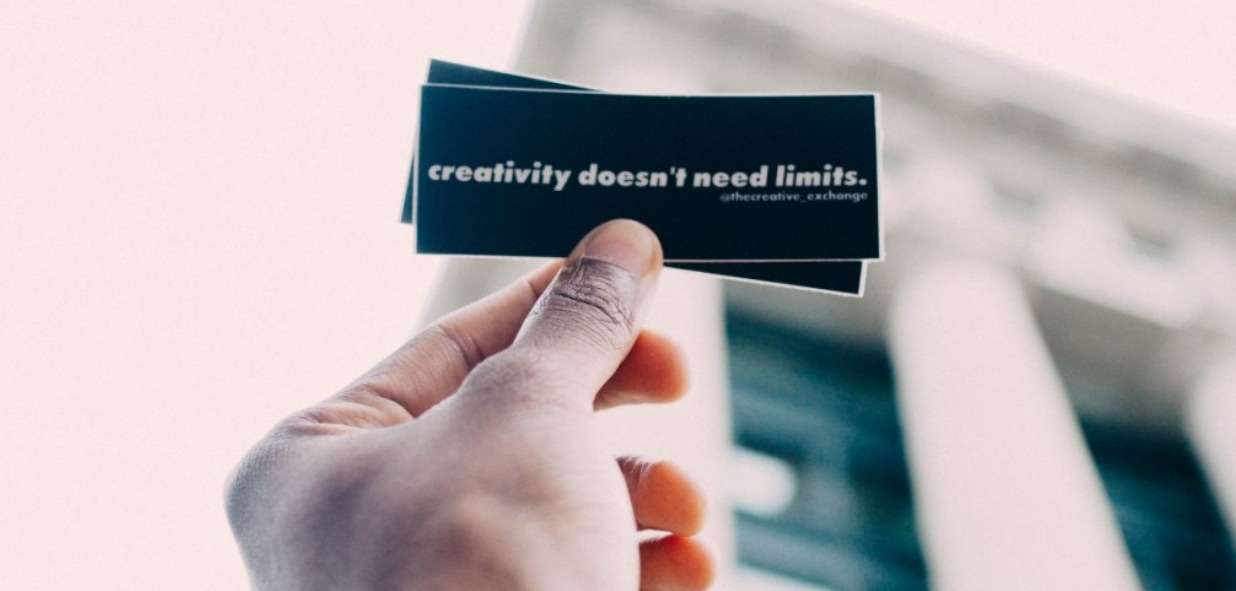Freelance work is becoming even more common as more and more people are taking advantage of the Internet to work from home, have flexible hours and work on what they really like!
And of course, because we are remote, we use the internet practically full time. And it’s from there that we get projects to work on, such as Workana, which is an online platform for freelance and remote work.
It’s also in some social media that we ask for help, as in Facebook or LinkedIn groups, Instagram profiles or even through chat platforms like WhatsApp. With all this interaction, have you ever taken a moment to think about your personal and professional behavior towards social media?
And as a self-employed professional, what happens to the issues of etiquette and ethics online? When entering a company to work in person, as fixed employees, it’s very common to sign a document of conduct at work. But what if we’re self-employed? Who dictates these rules for us?
Is it an anything-goes situation, or is it necessary to ponder our behavior, what is said, how we expose ourselves, how we interact and even the way we like a post or another? This is a controversial subject and one that generates a lot of disagreement, but I think it’s one worth talking about it.
Is the internet a no man’s land?

Check out these numbers:
- 3.4 billion people are actively active in social media around the world.
- 70% of recruiters use social media to find candidates.
There’s no escape, social media are already part of our daily lives and they, in turn, expose our personal and professional lives in a unique way. I can certainly say that there has never been any other media that did this before.
They interfere directly in our lives, through 3 points:
- Personal (as an individual),
- Professional (as an employee or individual entrepreneur/professional freelancer) and
- Brand (as an organization).
Really, there’s nowhere to run!
You have to understand that by exposing yourself in a less ethical or appropriate way, you can pay a price that is sometimes quite high. One must know how to combine common sense and polite behaviors.
Recently, a few interesting cases went viral on social media.
One of them was a girl who publicly complained through her Twitter account that she was working on a Saturday on something she was hating. Without her least expecting, the contractor saw and responded to the post, and the result saw her disconnected from the project.
Last year, an employee in one of the biggest airline in Latin America also lost his job by releasing on the Internet a video embarrassing a woman during the Russian Cup.
And, last but not least, did you see what happened to the girl who got an internship at NASA and, when celebrating on Social Media, swore at her counselor via Twitter? Obviously, her internship was lost…

So, having good professional etiquette is essential not only for fixed employees and trainees but also fundamental for professional freelancers, after all, which entrepreneur will trust a professional who has dubious behavior in social media?
It’s no use being a great professional with a good academic background but who expresses themselves inadequately on social media. And if you think this doesn’t impact your freelancing life, you’re wrong!
Just as there are etiquette rules at a dinner party, the labor market also has some behavior rules that help vent some activities.
When hiring a professional freelancer, the entrepreneur wants to find a perfect match for the job. That means a lasting relationship so that it’s easy for him to assign tasks to a professional whenever necessary. And be aware that these clients search for personal references for the professional through social media.
Good professional habits are highly valued, both at the time of hiring and when deciding whether the relationship will be short or long-lasting.
Because of this, it’s important to talk about professional etiquette on social media.
Etiquette tips for your online life

Our ability to interact positively with other people, share interesting and useful things, and act democratically in groups all demonstrates a professional’s ability to develop effective relationships.
The main types of content that keep clients away shouldn’t come as a surprise to you: inappropriate photographs, videos, discriminatory comments, bad-mouthing a previous or current company, a service provider, a co-worker or even showing limited communication capacity.
As I mentioned earlier, social media has a direct impact on our personal and professional lives. It doesn’t matter if you’re a fixed employee or a freelancer. You should reconsider your life online and think about whether there’s something that negatively impacts your professional relationships. You should always consult the usage and privacy policies of the companies to which you provide service.
Here at Workana is no different, we also have unique policies of use, privacy, terms, and conditions. You can review all of them in our Help Center.
Before posting or commenting on a personal network, consider:
- Am I venting or whining? Venting and whining may sound all good, but posting an outburst won’t help you at all! On the contrary! You will expose yourself and, oftentimes, expose third parties. Also, don’t post negative comments or gossip.
- Did you ask the person for permission before tagging her? A certain situation may be interesting for you, but your friends, family or employer may think differently. Always check before tagging people in your posts.
- Did you read the entire story before you commented or shared it? Don’t be a fake news contributor. Also, don’t jump to conclusions if you only read the title of a story.
- Is this the right channel for the message? Not everything should be said on social media. Consider the feelings of the other person. Some messages should be given in person, by phone or email.
- Am I logged into the right account? There are many corporate examples of embarrassing posts that have been published in official brand accounts. Always check which account you are logged into (this applies especially to those who work with Social Networking Management). Don’t post personal information on the brand accounts you administer.
- Does my post meet the Social Media Use Policy? Most organizations have official social media policies that you probably became aware of at the time of hiring. Don’t assume that you already know what the policy says. Many employees were fired for failing to follow company regulations. Make sure you know and follow the requirements of the employer or client.
- Does my post undermine the reputation of my company? No matter how many disclaimers you put into your accounts, such as “the views are mine”, certain content and behavior will negatively affect your employer. If you state where you work in your biography, your personal account represents your employer.
- This helps or harms the marketing of my company?
- Would my boss/client be happy to see this post? You may not have a close relationship with your boss or client, but a co-worker could and your post can be shared or be print screened. Even private accounts are never completely private.
- Am I being fair and correct? Everyone has the right to personal opinion, but if your opinion tends to be unfounded, it’ll reflect negatively on you.
- Am I being respectful and not malicious? People can feel offended through criticism and even annoyed by certain posts. This doesn’t convey a professional image. Don’t post what you wouldn’t say personally. It’s important to remember that a malicious post is there forever.
- Does it respect intellectual property? Not everything on the internet is free. Check beforehand or get permission to publish company or customers’ branding materials and content.
- Is this information confidential? As an employee or contractor, you have access to privileged and confidential information. Don’t assume it’s good to share. Don’t disclose company or customer information that is not public.
Final considerations!
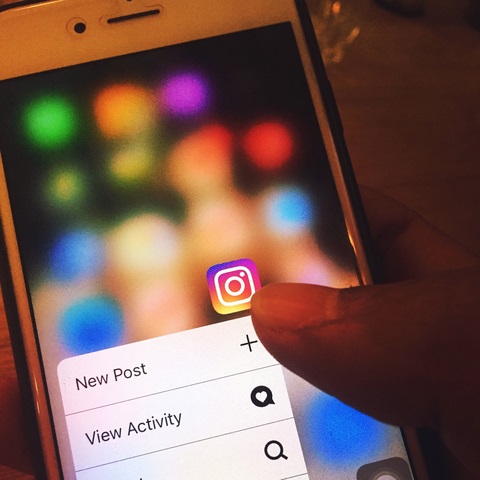
We’ve already seen that the current world is online and full of social media. Maintaining an active social life means keeping in touch with others on Facebook, Linkedin, Instagram or Twitter.
You can even try not socializing with people you just have a professional relationship with. But you see, if a customer starts following you on your personal blog, there’s not much you can do. A friend request sent via Facebook or Instagram is equally hard to refuse when the person who invited you is the person who is paying for your services on a regular basis.
One option I found was to reduce my time online, browsing, commenting and sharing amenities and other things that don’t add much in my personal and professional life. I understand that if my clients see me spending a lot of time on Facebook, they may also get the idea that I’m wasting time and not working on their projects. In the end, this new attitude was great! It brought me more productivity and focus.
Currently, I use LinkedIn more often as it’s a good place to communicate professionally and expand my professional capacity. LinkedIn also gives a freelancer access to many groups and forums. These can help you expand your knowledge through the topics that are addressed and discussed.
Here at Workana itself, we’re using this network to share some opportunities:
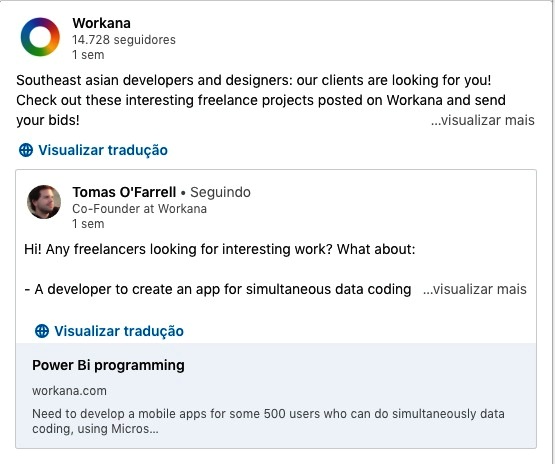
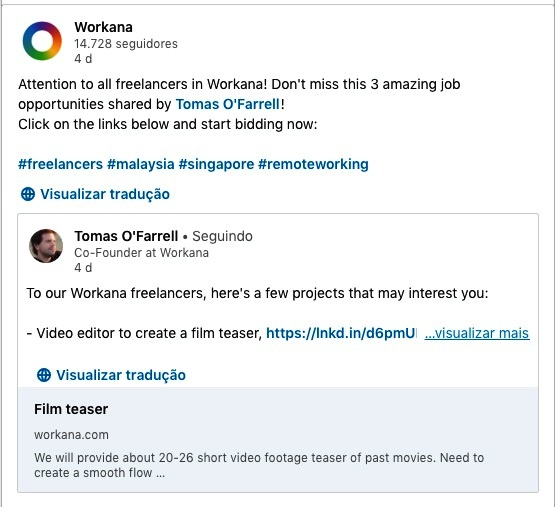
Plus, the more active the freelancer is in these types of groups, the more likely they are to learn and grow with others. Potential customers can realize that. The freelancer who looks for current trends earns extra points, as their reputation is elevated for being at the forefront of their field.
Using social media without caution can crumble your freelance career. Make the right choices, and a customer can be yours for life. Make the wrong choices, and you’ll spend eternity looking for customers day after day.



